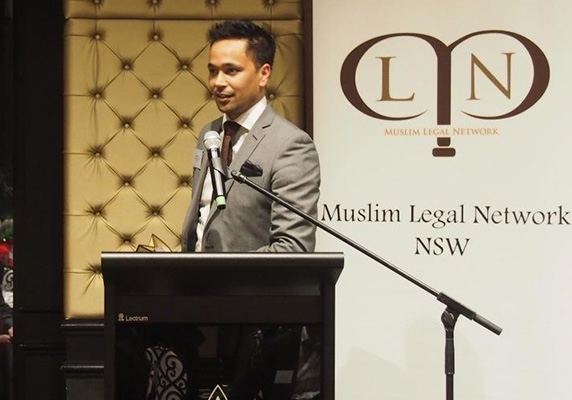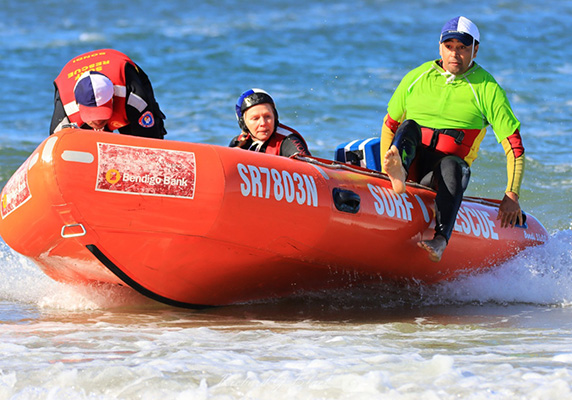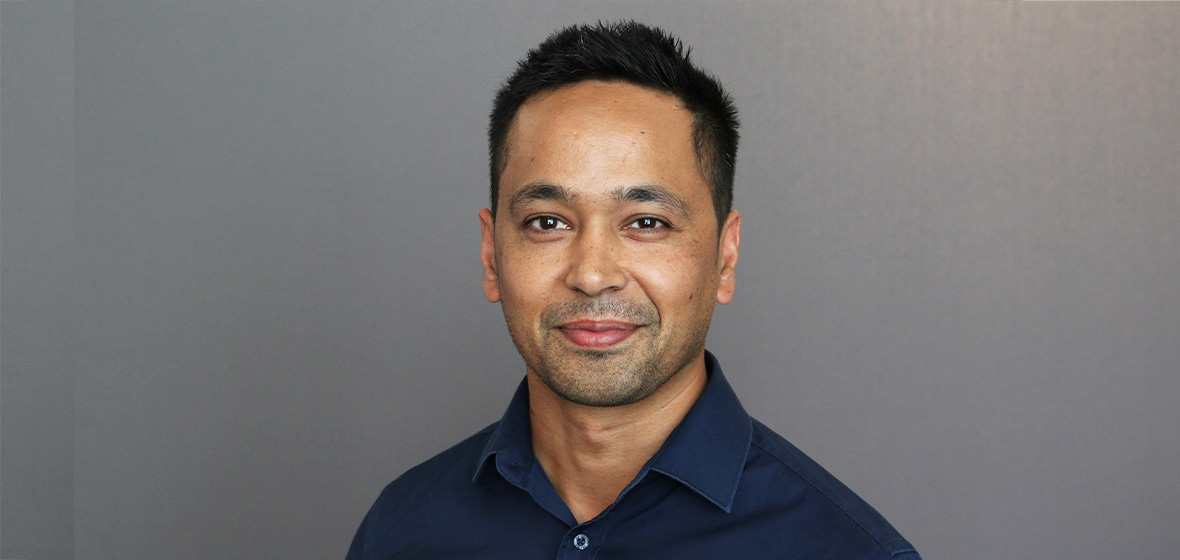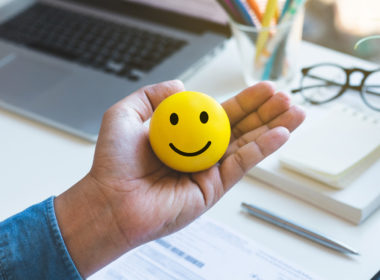Reaching his current position as principal legal counsel at TAFE NSW hasn’t been a linear path for Zaahir Edries. His choices have always been dominated by a mix of pragmatism and deeply held values.
Considering his family background and values, the law makes perfect sense for Zaahir Edries. “I’m a migrant kid, born in South Africa. I left in the 80s – my parents didn’t see a way forward for us. We’re not white kids.
“So, like every other migrant brown kid that comes to Australia, it’s ‘you will become a doctor or a lawyer or an engineer’.”
“I always had a passion for social justice. Mum started studying law when she was pregnant with me. … it’s sort of in our family, in our genes – not that anyone before me has become a lawyer. But the idea is, justice and equity have always been bred into us.”
For Edries, the key catalyst for change came in 2001: “I think I first thought about [becoming a lawyer] just after September 11.”
Edries is Muslim. His faith and community are a key part of his life: both things were thrust into public discourse after 11 September 2001. He explains: “There was a lot of negativity around, where I grew up in Perth … it wasn’t a terrible place to grow up, but it wasn’t the most tolerant place in the world.”
“[9/11] had a profound effect on people. There are a lot of stories around children who were born post-9/11 versus those Muslim kids who became adults before then. I was nineteen or twenty around then, and I thought, ‘I want to do something good’.”
Edries had few role models like him in the law. But despite this, he says, “I think ultimately I wanted to become a lawyer because I’ve always had a strong sense of justice.”
Traditional pathway out of reach
After completing his Legal Studies degree in Western Australia, Edries moved to Sydney in 2004 to study a Masters of Legal Practice (now a Juris Doctor) at UTS, as he “was really passionate about human rights and international law.”
He continues: “I worked while I studied because Sydney is an expensive place, as a legal project coordinator at Allens. I really enjoyed it. It was great exposure to what it was like to be at a top tier law firm at 23 years old – [and] a bit of a shock.”
But for Edries, it became evident that his path might not be so simple, especially compared to that of his peers: “I realised as a post-grad [student] that in my pathway to the law, to a graduate role, I was never going to be able to do just a summer clerkship at a top tier firm, because I needed to pay rent.
“Ultimately, it’s about class. [I know] I would have done much better at university if I had more hours in the day to study. But the reality was, I had to work 40 hours a week, so I could pay rent, and study, and eat. And so my study time was between 9pm and 1am, every day.”
‘I would have done much better at university if I had more hours in the day to study. But the reality was, I had to work 40 hours a week, so I could pay rent, and study, and eat.’
With the ‘traditional’ pathway looking out of reach, Edries shifted his perspective: “I started thinking about what the long term goal was, and that was skilling up so that eventually I could help people. I always thought I wanted to be either a human rights prosecutor or some sort of litigator.”
With that in mind, Edries took a role as an Investigator at RailCorp: “[That role] crafted a lot of skills that I needed later in my career.” He acquired these skills in through talking and listening to people in client interviews.
Once Edries finished his Masters degree and PLT, he found a graduate role at Middletons, working in litigation. “I got my passion [there] – I thought one day I’m going to work in international criminal tribunals. Human rights has always been a thing of mine, in the bigger picture, so I thought the way to pick up similar skills was in the litigation space.”
Networks and new roles
Around this time, Edries was “three or four years post-admission”. The inequalities that had coloured his youth and studies were still present.
He says: “I was often the only one, or maybe one of two or three people, who looked and sounded [like me], and had funny names. It’s changed now, but at that time, [the difference] was really quite apparent.”
Accordingly, he was inspired to create a space for his peers.
“I helped establish a legal support network here in NSW called the Muslim Legal Network (NSW), which has since become the largest Muslim legal representative body in the country. It was established in 2010. I’m still really proud of it.
“It started out as a peer support network. Today there’s over 200 members, lawyers, students, academics, associate members across NSW and their sister organisations as well.”

While working with the Muslim Legal Network (NSW), Edries continued gathering diverse professional experience. He worked at DLA Piper for a few years, “where we were doing things like law reform work. That was something that kept my passions rising when I knew I had to pay the bills somehow.
“But I really still had this passion for social justice, human rights, law reform work at the core of me. I knew I needed to move on from private practice.”
Seeking a change and better work/life balance, Edries took his first in-house role, at SunCorp: “I was still doing litigation work, but it was for a general insurer and a bank and they had previously been my clients. So the transition into working for them was an interesting space. Professionally, it was a decision I made with quite a lot of care.
“I knew that, once you step out of private practice, [people ask] ‘is this a trajectory you want to take?’.” But, having had nearly a decade in private practice, he says, “it was a good time to move into that in-house role.”
Never one to do just one thing, Edries also maintained his work in the Muslim Legal Network (NSW). He says: “I was the [Network’s] president for four years. It was really encouraging. I gave evidence at half a dozen parliamentary inquiries, because of the law reform work that we were doing. I felt a really lovely fulfilment in that.”
A tap on the shoulder
In 2018, another opportunity was presented to Edries: to work in a space aligned with his passion for social justice.
“I got a tap on the shoulder from the board of Get Up, which is Australia’s largest advocacy organisation, asking me if I would be interested in setting up their general counsel practice.
“I didn’t know it, but it was the role I was thinking about in 2005, 2006, when I was picking my electives for my international law masters coursework at UTS, thinking, ‘wow, I’d love to this sort of political and legal advocacy work, I’d love to that sort of campaign work’.”
He adds, “Get Up was two years old when I started my law degree, and suddenly, in 2018, I was 35, 36, I was asked to become a general counsel. It was a big thing, it was flattering.”
“I ummed and aahed, and spoke to my wife about it. I took a big hit financially. [But it came at] a really interesting time, because I was questioning whether or not I still loved the law. I think a lot of people ask that question after about 10 years. And I thought, ‘I actually do love what I can do with it’.”
‘I was questioning whether or not I still loved the law. I think a lot of people ask that question after about 10 years.’
“I remember in my application I said, ‘rarely do you find an opportunity where personal and professional values align so closely, which is why I’m so passionate about getting the job’.”
“[Get Up was] a lovely job, but highly stressful,” Edries says. “General progressive political and legal advocacy in a time when Australia had some of its most conservative government policies was not the easiest thing to do. It was stressful, but I thrived on it. Maybe I’m a masochist, but litigators are always up for a fight.”
“I decided to take a [short] break.”
A new kind of accountability
For the last four months, Edries has been in a new role: as principal legal counsel at TAFE NSW. “It’s a very interesting role. It’s new to me, it’s much broader than I thought, but that was my next step.”
Edries’ enthusiasm for education and personal growth makes TAFE an appropriate workplace: “I’ve always valued the power of education in life. I love that even though I’ve been through eight years of tertiary education at university, I could do a welding course at TAFE. And now I’m also a fitness instructor – I did that through TAFE too.”

The new work environment at TAFE NSW has presented a share of interesting challenges for Edries. He says, “I’d spent all of this time working in high value, high strategy, high stakes roles, running an organisation like Get Up – being on the executive there, I was accountable for all things.”
“Whereas at TAFE, it’s about talking through the accountability of what it’s like to behave in the public sector, why it’s important for us to take a legal lens to things, because we’re working with public funds.
“We’re doing things on a much bigger scale. My day can consist of anything from looking at a 300-page commercial contract to speaking to someone about a disability access issue, and why that’s important for our students.”
“For me, the challenges are mixing your legal skill set with the other skills that I’ve gained over my career. The time [working in] in-house before has given me the ability to be able to say, ‘okay, now I’m able to use my emotional intelligence that I’ve developed over the years’, in a place where you’re not just dealing with lawyers, you’re not just dealing with sophisticated clients, you’re dealing with someone who might run a childcare centre for TAFE, or need to take on changes in many different policies.
The difference from his previous roles, he says, is in needing to consider “commerciality, decisions around [a] 300 page commercial contract […], but then also sitting down with the business and saying ‘here is why we’re looking at that’, and ‘tell me where we’re going next’, because the reality is, [we need to ask if] this is going to be beneficial for our learners.
“The other side is the need to look at the political landscape. We have to understand where we are in the grand scheme of budgets, and what that looks like. So I find the mix and the challenge is really what got me here, and is why I still wake up and still love the law.”
Highlights: community, advocacy, inclusivity
Edries mentions three career highlights. The first is a personal highlight, relating to his work in the Muslim community.
“There’s a group in Australia that started these awards, maybe 10–15 years ago, called Mission of Hope, a Muslim organisation that does a bunch of wonderful things in the community. They started the Australian Muslim Achievement Awards. In 2019, I was nominated […] for Professional of the Year, and I won that category.”
“It was really lovely, because I’ve never gone for accolades or care for them, but it’s wonderful to be recognised by your community for your work.”
Edries describes his second career highlight, experienced at Get Up, as a “technical” one: “I worked relatively closely with the First Nations Justice team, and I helped worked on something that’s still going on at the moment: some submissions on Aboriginal cultural heritage and why that was important.
“I [worked with and] instructed Greg McIntyre … the barrister who took the Mabo decision at first instance before it went to the High Court. It was really lovely knowing that the work that I’d done in the years leading up, skills on law reform and judicial enquiry, all of those sorts of things had made it to the point where it was really tangible.”
Edries’ third career highlight relates to work done as a member of the Law Society NSW’s Diversity and Inclusion committee. “Last year I was involved in drafting a cultural diversity guidance note, which has since been adapted by the Law Society,” he says.
This note details six key ways in which the profession at large can work to create workplaces which are more diverse and representative, with consideration of networks and structures of privilege.
Values at the centre
Reflecting on his career, Edries laughs. “My friends and family joke, ‘you’ve been a lawyer for 15 years now; when are you going to be rich?’”
Personal values have always been central for Edries. He has little interest, he says, in the types of law that yield the wealth about which he jokes. “We as lawyers are ultimately supposed to uphold dignity and protect the vulnerable. We can do better. We should be striving to do that.”
‘We as lawyers are ultimately supposed to uphold dignity and protect the vulnerable. We can do better. We should be striving to do that.’
Edries adds, “We’re not protecting the vulnerable when we’re making sure that x company only pays $255 tax a year on their $32 billion of revenue because they’re registered in the Caymans.”
Not a linear path
Given his own history, Edries advises early career lawyers on how to alleviate the pressure of succeeding from the outset: “Be mindful of what you can take on, because it’s very competitive. I look back now and realise I had to [find a] balance. I wasn’t getting high distinctions across the board. I knew I needed something else [to build my skills]. So I got a full-time job in the industry, I did all those sorts of things that meant it wasn’t a linear path. Not everyone’s path through the law is linear.
“Don’t stress yourself out thinking you’re not going to get there the [usual] way,” he adds. “Don’t be hard on yourself; give yourself a break.
“Seek a support network – not only in the law – find connections that are supportive and happy and enjoyable.
“And as a fitness instructor I’d say, make sure you get 30 minutes of exercise every day.”
Edries concludes, “Investigate the avenues for using your law degree to do what you want to do. You don’t necessarily need to be practising in the ways you’ve seen others do.
“You don’t have to be the lawyer you see out there, a traditional lawyer. I classify myself as a human rights lawyer, and a movement lawyer.
“You can be your own kind of lawyer. Be a lawyer that makes you proud of being a lawyer.”




